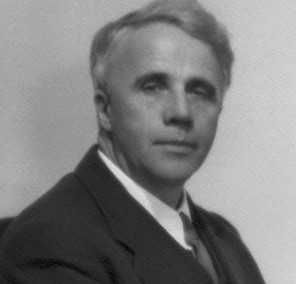Meaningful form

Robert Frost, 1874-1963
From the Robert Hughes documentary on Robert Frost, A Lover’s Quarrel with the World, filmed in the last year of Frost’s life, recently shown on PBS. He talks using the vocabulary of his poetry, the simplest and most elemental language, words as clear as a mountain creek in conversation, and they seem to be just as clear in the poems, though so often they withhold as much as they reveal. His lines are as inexhaustible as Emily Dickinson’s, plain-spoken but sometimes as tough to open up as a koan. The notion of withdrawal here is so resonant as well as the comparison of writing poetry to chopping down a tree or cutting grass–wresting order and form from the world. Hayden Cayruth, in a University of Rochester workshop I attended many years ago, spoke about how the act of writing generates an almost physical pleasure, and that wrestling with words for him actually seemed like a physical task. So much of painting is exactly that: an almost entirely physical, form-making engagement with the world that somehow generates meaning. Does anyone know how that happens? Frost always said he had no idea what a poem would say when he started, but as he worked on it, he followed the words where they led, like ice on a hot stove riding its own melting. The meaning arose from the act of making it, not the other way around.
From the documentary, a few of Frost’s thoughts on poetry, but they might as well be about painting:
Never do it to pay a bill. Because you probably won’t. It comes to market in the long run, but you can’t write it that way. The only self-conscious thought I ever have is “this seems to be going pretty good!” Another step, “still going!” It’s like skating on thin ice when you might go through. Once I’m going, I think it’s like starting a sled at the top of a hill and it goes hard to start but you get right over that gritty place and . . . she goes. We don’t escape. That’s a word I loathe. But retreat. You retreat for strength. You aren’t brought up in the right religion if you don’t know what retreat is. You withdraw . . . I’ve often said that every poem solves something for me in life. I go so far as to say that every poem is a momentary stay against the confusion of the world. But of course any psychiatrist will tell you making a basket or making a horseshoe or giving anything form gives you confidence in the universe, that it has form. When you talk about your troubles, you’re a fool. The best way to settle them is to make something that has form. All that makes you healthy and well is the feeling that there is some sort of poem to your business, your occupation. Two or three of my favorite things are a scythe, a hayfork and a fountain pen.
Comments are currently closed.